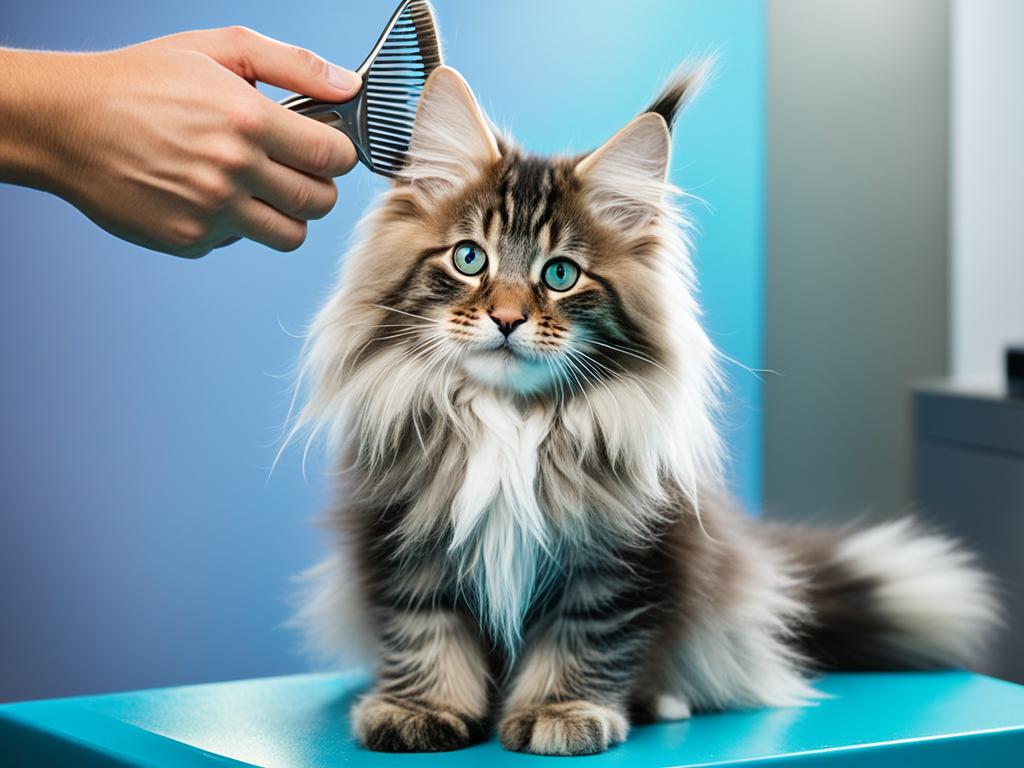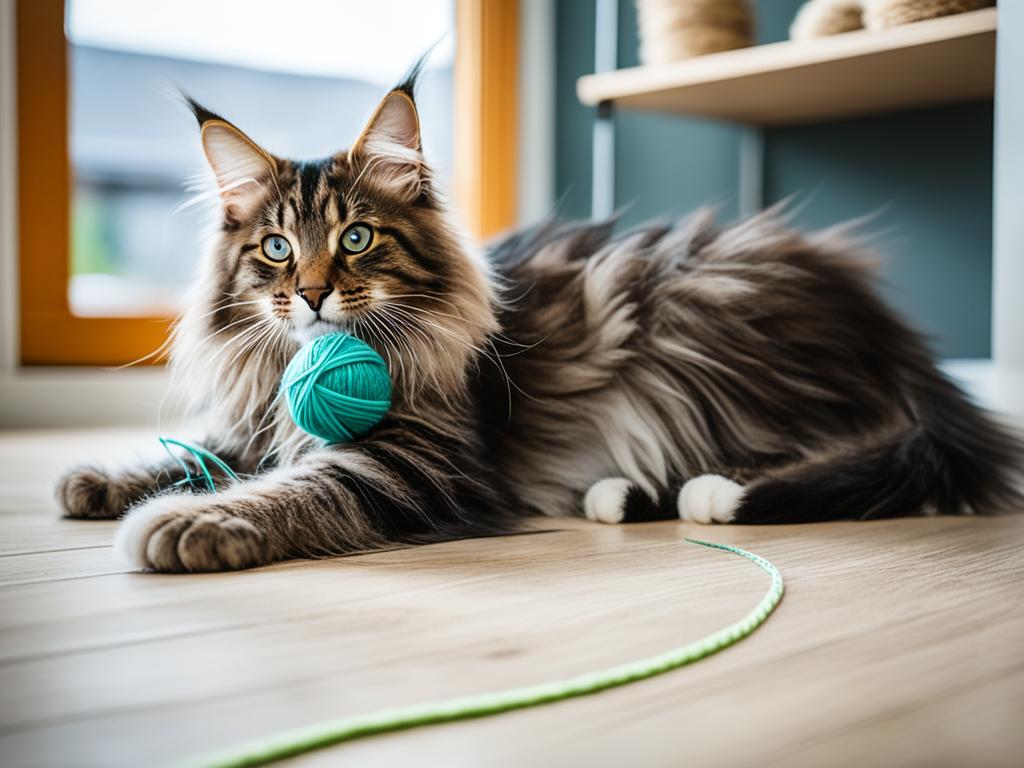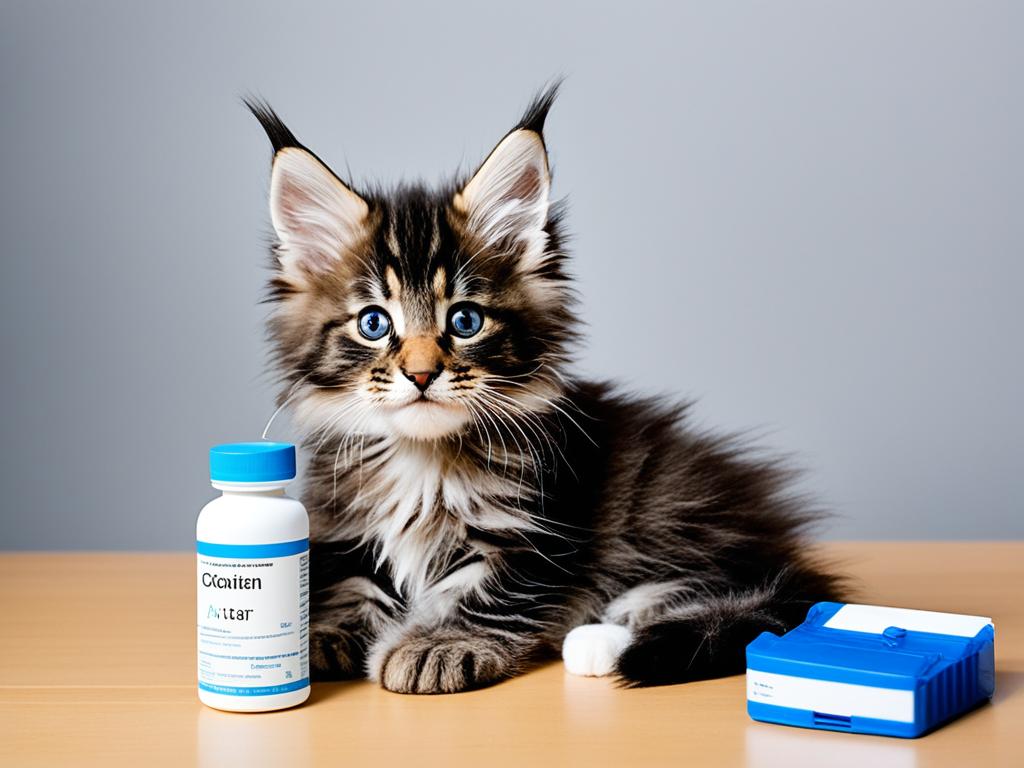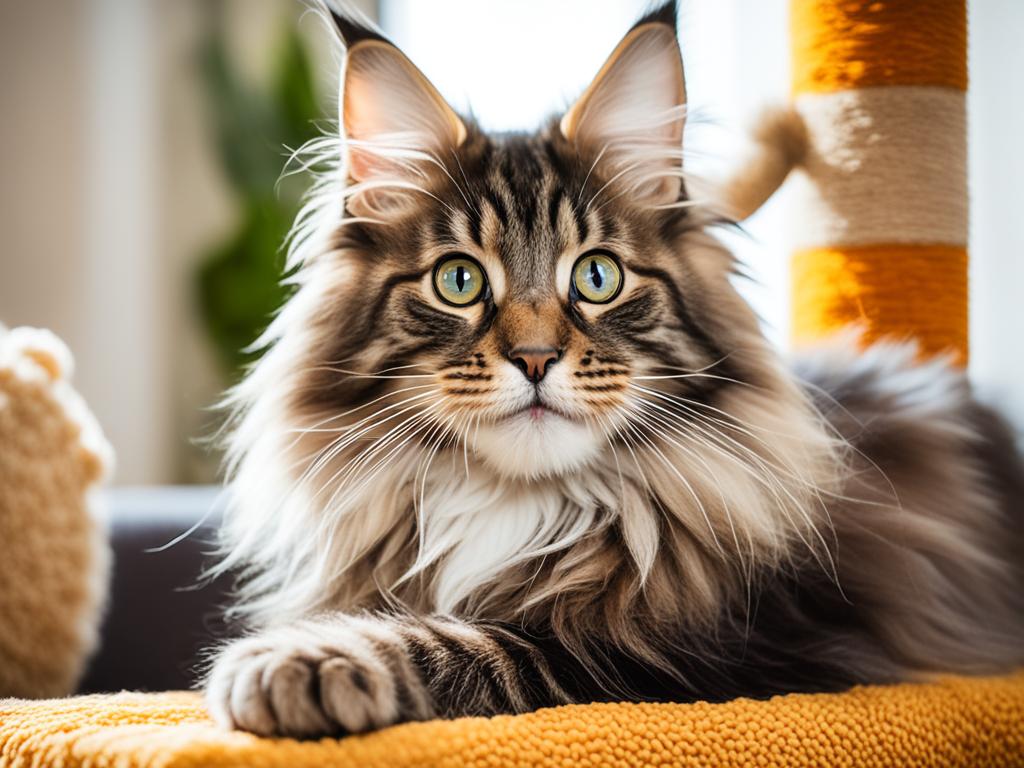Maine Coon kittens are not just adorable; they are also known for their sociable nature and striking looks. If you are a proud owner of a Maine Coon kitten, it’s important to understand the specific care needs of this unique breed. From grooming to training, nutrition to health, we have gathered expert tips to help you provide the best care for your furry friend.
Key Takeaways:
- Maine Coon kittens require special attention and care due to their unique breed characteristics.
- Regular grooming is crucial to keep their luxurious coats healthy and prevent hairballs.
- Socialization and training from an early age will help your Maine Coon kitten develop good behavior and adaptability.
- Proper nutrition is essential, with a focus on high-quality cat food rich in animal protein and fat.
- Be aware of potential health issues that can affect Maine Coon kittens, such as hip dysplasia and hypertrophic cardiomyopathy.
Now, let’s delve into the specifics of caring for your Maine Coon kitten, ensuring they receive the attention and love they deserve.
Maine Coons Love the Outdoors
Maine Coon kittens have a natural affinity for the great outdoors. They are adventurous, curious, and love exploring their surroundings. Engaging them in outdoor activities not only provides them with physical exercise but also stimulates their hunting instincts, which are deeply ingrained in their breed.
One of the best ways to indulge your Maine Coon’s love for the outdoors is by creating a safe and secure outdoor space for them to enjoy. A garden with tall fences or enclosures can provide a controlled environment for your kitten to explore and play in.
Outdoor playtime offers numerous benefits for Maine Coon kittens. It allows them to engage in physical activities, which help them burn off excess energy and maintain a healthy weight. It also provides mental stimulation as they navigate their environment, climb trees, and chase after bugs.
Hunting Behavior
One fascinating aspect of Maine Coon kittens’ outdoor activities is their hunting behavior. Maine Coons are natural-born hunters and may exhibit their hunting instincts even at a young age. They may chase after small birds, rodents, insects, and even frogs.
Risks of Outdoor Play
While outdoor playtime can be enriching for Maine Coon kittens, there are risks to be mindful of. They may encounter potential allergens, consume harmful plants, or even ingest prey that can cause food poisoning or upset stomachs.
It’s crucial to pay close attention to your kitten’s outdoor adventures and observe any potential signs of health issues. If you notice any changes in their behavior, appetite, or appearance, it’s best to consult with a veterinarian promptly.
| Outdoor Activities for Maine Coons | Risks |
|---|---|
| 1. Exploring the garden | Allergies |
| 2. Climbing trees | Food poisoning |
| 3. Chasing insects | Upset stomachs |
| 4. Playing with toys |
Keep in mind that outdoor playtime should always be supervised to ensure the safety and well-being of your Maine Coon kitten.
Grooming Your Maine Coon Kitten
Maine Coons have long, luxurious coats that require regular grooming to control shedding and prevent hairballs. A proper grooming routine is essential to maintain the health and appearance of your Maine Coon kitten. In this section, we will discuss the necessary steps to keep your kitten’s coat healthy, prevent hairballs, and maintain their overall well-being.
Minimize Shedding with Daily Brushing
Regular brushing is crucial to keep your Maine Coon kitten’s coat healthy and reduce shedding. The long, dense fur of Maine Coons tends to trap loose hair, which can lead to hairballs if not removed. By establishing a daily brushing routine, you can remove loose hair and prevent it from being ingested during grooming sessions. Use a high-quality brush or comb specifically designed for long-haired cats, such as the Furminator or Safari.
Start by gently brushing your kitten’s fur in the direction of hair growth, paying special attention to areas prone to matting, such as the underarms and belly. Be patient and avoid tugging or pulling on any tangles or mats to prevent discomfort. Regular brushing not only helps keep your kitten’s coat clean and mat-free but also promotes bonding between you and your furry companion.
Prevent Hairballs for a Healthy Digestive System
Maine Coons are prone to hairballs due to their long fur and meticulous grooming habits. Hairballs can cause discomfort and potentially lead to serious digestive issues. To prevent hairballs, incorporate the following tips into your grooming routine:
- Offer hairball prevention treats or supplements formulated to assist with hairball passage.
- Provide a balanced diet that promotes healthy digestion and minimizes hairball formation.
- Encourage regular exercise and hydration, which helps with hairball elimination.
Trim Nails for Comfort and Safety
Regular nail trimming is necessary to keep your Maine Coon kitten’s nails at an appropriate length and prevent them from becoming sharp or causing injury. Trimming your kitten’s nails every two weeks can help avoid discomfort during playtime and prevent accidental scratches to you or your furniture.
Use a pair of cat nail clippers or a nail grinder specifically designed for cats to trim the tips of the nails. Be cautious not to cut the quick, which is the sensitive part of the nail that contains blood vessels and nerves. If you’re unsure how to trim your kitten’s nails, consult a professional groomer or your veterinarian for guidance.
Establishing a Grooming Routine
Starting a grooming routine when your Maine Coon kitten is young is beneficial for both you and your furry friend. It allows them to become familiar with the process and creates a bonding experience. Follow these tips to establish a successful grooming routine:
- Start grooming sessions gradually, keeping them short and positive to avoid overwhelming your kitten.
- Use treats, praise, and gentle strokes to reward your kitten during grooming sessions.
- Choose a quiet and comfortable space for grooming to minimize distractions.
- Make grooming a regular part of your kitten’s routine to build familiarity and acceptance.
A consistent grooming routine not only keeps your Maine Coon kitten looking their best but also promotes a healthy and happy relationship between you and your feline companion.

| Treat/Supplement | Description |
|---|---|
| Cat grass | Provides natural fiber that aids in hairball passage. |
| Hairball control treats | Contain ingredients that help lubricate and eliminate hairballs. |
| Hairball control supplements | Formulated to promote healthy digestion and reduce hairball formation. |
Handling Behavior and Training
Maine Coons are highly intelligent and trainable cats. Starting training and socialization when they are kittens can lead to positive results. Engaging them in playtime activities like fetch, tag, and hide-and-seek encourages mental stimulation and bonding. Using treats and clicker training will reinforce good behavior and make the training process more enjoyable. It’s important to keep training sessions short and fun, as cats have short attention spans.
Kitten Socialization
When it comes to Maine Coon behavior, early socialization is key. Exposing your kitten to various people, animals, and environments helps them become accustomed to different stimuli, reducing the likelihood of fear or aggression later in life. Introduce your kitten to new experiences gradually, starting with positive and controlled interactions. This can include inviting friends or family members over, taking your kitten to a well-managed cat park, or arranging playdates with other friendly cats. Remember to monitor each interaction and provide a safe and calm environment for your Maine Coon kitten to explore and learn.
Kitten Training
Training a Maine Coon kitten can be a rewarding experience for both you and your furry companion. Start with basic commands such as sit, stay, and come using positive reinforcement techniques. Reward your kitten with treats and praise whenever they exhibit the desired behavior, and be consistent with your training sessions. Keep in mind that Maine Coons respond well to positive reinforcement, so avoid punishment-based methods that may make them fearful or anxious.
Playtime Activities
Playtime is not only fun for Maine Coon kittens but also essential for their physical and mental well-being. Engage your kitten in interactive play sessions using toys that simulate hunting behaviors, such as feather wands or interactive puzzle toys. These activities help satisfy their natural instincts and provide mental stimulation. Additionally, rotate their toys regularly to prevent boredom and keep them interested.

Positive Reinforcement
Positive reinforcement is an effective training approach for Maine Coon kittens. By rewarding desired behaviors with treats, praise, or playtime, you can encourage their good behavior and reinforce the connection between positive actions and pleasant outcomes. Clicker training can also be a useful tool to mark desired behaviors and provide clear communication with your kitten. Remember to be patient and consistent throughout the training process, as it may take time for your Maine Coon kitten to learn and respond to commands.
| Training Tips for Maine Coon Kittens | Benefits |
|---|---|
| Start training early | Builds a strong foundation for positive behavior |
| Use positive reinforcement | Strengthens the bond between you and your kitten |
| Keep training sessions short | Fits their short attention spans and prevents frustration |
| Make training fun and engaging | Motivates your kitten to participate and learn |
Common Health Issues in Maine Coon Kittens
Maine Coons are generally healthy cats, but they can be susceptible to certain health issues. Being aware of these conditions and their symptoms can help you provide the best care for your Maine Coon kitten.
Hip Dysplasia
Hip dysplasia is a genetic condition that affects the hip joint. It can cause weakness, pain, and difficulty in later life. Symptoms may include limping, decreased activity, or difficulty getting up and down. Regular veterinary check-ups and early intervention can help manage this condition.
Hypertrophic Cardiomyopathy
Hypertrophic cardiomyopathy is a common heart condition in Maine Coons. It involves the thickening of the heart muscles, which can lead to obstruction of blood flow and potentially severe symptoms. Symptoms may include difficulty breathing, coughing, or fainting. Regular cardiac screenings and monitoring are crucial for early detection and management.
Weight Management
Maintaining a healthy weight is essential for Maine Coons to prevent joint issues, diabetes, and heart/respiratory problems. Obesity can put additional strain on their joints and organs. Proper nutrition and portion control, along with regular exercise, are key to managing their weight.
Here are some important symptoms to watch for in your Maine Coon kitten:
- Changes in appetite or eating habits
- Lack of energy or lethargy
- Coughing or difficulty breathing
- Limping or lameness
- Excessive thirst or urination
- Noticeable weight loss or gain
- Vomiting or diarrhea
- Changes in litter box habits
Regular veterinary check-ups and open communication with your veterinarian are essential for the early detection and treatment of any health issues that may arise.
| Health Issue | Symptoms |
|---|---|
| Hip Dysplasia | Limping, decreased activity, difficulty getting up and down |
| Hypertrophic Cardiomyopathy | Difficulty breathing, coughing, fainting |
| Weight Management | Obesity, joint issues, diabetes, heart/respiratory problems |
Remember to observe your Maine Coon kitten closely and seek veterinary care if you notice any concerning symptoms. By staying proactive and providing proper care, you can help ensure a long and healthy life for your beloved Maine Coon.

Nutrition for Your Maine Coon Kitten
Proper nutrition plays a vital role in ensuring the health and well-being of your Maine Coon kitten. It is important to provide them with a high-quality cat food that meets their specific nutritional needs. A meat-based diet is ideal for Maine Coons, as it provides the necessary animal protein for energy, muscle development, and overall growth.
When choosing cat food for your Maine Coon, look for options that are rich in animal protein sources such as chicken, salmon, tuna, and liver. Animal protein contains essential amino acids that are crucial for the kitten’s overall health, including the development of a healthy coat and proper organ function.
In addition to animal protein, animal fat is also an important component of your Maine Coon’s diet. It not only adds flavor to their food but also serves as a secondary source of calories. Avoid cat foods with bulking agents like wheat, corn, and peas, as these can disrupt your kitten’s digestion.
When evaluating cat food options, consider the nutrient group percentages. It is recommended to choose a cat food that contains at least 50% animal protein, up to 20% animal fat, and less than 3% carbohydrates. This balance of nutrients will help support your Maine Coon’s growth and overall health. Brands like Untamed offer vet-designed formulas with high levels of meat or fish, ensuring optimal nutrition for your Maine Coon kitten.
FAQ
What are some risks associated with outdoor activities for Maine Coon kittens?
Outdoor activities expose Maine Coon kittens to potential risks such as allergies, food poisoning, or upset stomachs from consuming harmful prey.
How often should I groom my Maine Coon kitten?
It is recommended to groom your Maine Coon kitten daily to control shedding and prevent hairballs. Regular grooming also includes trimming their nails every two weeks.
Can Maine Coon kittens be trained?
Yes, Maine Coon kittens are highly intelligent and trainable. Starting training and socialization when they are young can lead to positive results.
What are some common health issues in Maine Coon kittens?
Maine Coon kittens are prone to conditions such as hip dysplasia and hypertrophic cardiomyopathy. It is important to be aware of the symptoms associated with these conditions for early detection and treatment.
What should I feed my Maine Coon kitten?
A Maine Coon kitten’s diet should consist of high-quality cat food that is rich in animal protein, such as chicken, salmon, tuna, and liver. Avoid foods with bulking agents like wheat, corn, and peas.

Leave a Reply